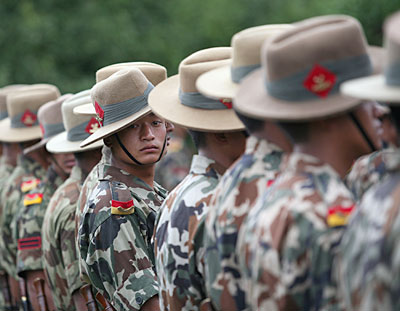 KIRAN PANDAY |
Two recent events news items, one on 23 October and the other on 27 October, are indicative of the government's and the Maoists' total disrespect for the rule of law and the need to address human rights abuses. Yet again.
The first piece of news was about alleged human rights violator Colonel Raju Basnet of the Nepal Army. On 20 October the cabinet, on the recommendation of the Ministry of Defence (which in turn acted at the behest of Army Headquarters), handed Col. Basnet a two-year extension.
The second news item referred to the Maoist Party's 'taking action' against one of its Central Committee members, Kali Bahadur Kham. The latter, also one of the deputy commanders of the PLA, stands accused of murder and there is an arrest warrant out for him.
Basnet has earned a level of notoriety that few others in the Nepal Army can rival. He is implicated in the alleged arbitrary detention, torture and disappearance of 49 suspected Maoists at the Maharajganj barracks under the Bhairabnath Battalion between 2003 and 2004. The battalion was then led by Basnet, a lieutenant colonel at the time. Both the National Human Rights Commission (NHRC) and the UN's human rights body in Nepal, OHCHR, have recommended investigations against Basnet and a suspension until the investigations are completed.
The extension Basnet has just been granted is distasteful from whichever angle you look at it. Basnet should be facing a civilian court, not getting an extension. An ad hoc court of enquiry that the army formed under Brig. Gen. Sharad Neupane in 2006 actually found Lt. Col. Basnet guilty and ordered his detention. This much is known. What followed the recommendation is not.
The Maoists, on the other hand, have carried on with the farcical pretense that they are punishing Kham. The party has so far shielded him and prevented the police from arresting him. Kham, along with three other Maoist combatants, allegedly tortured a Kathmandu-based businessman, Ram Hari Shrestha, in Shaktikhor cantonment in Chitwan in 2008. Shrestha succumbed to his injuries.
In this case too, NHRC and OHCHR have called for an investigation. A court has ordered Kham's arrest. What did the party do in response? It gave him a berth in their expanded Central Committee. Now the party is talking of 'punishing' him.
While the army's and the Maoists' actions are nothing new (after all, they have prevented civilian court trials for the most heinous crimes), Prime Minister Madhav Kumar Nepal's remarks on Basnet have been the unkindest cut of all.
According to news reports, PM Nepal has already passed his verdict on Col Basnet: the officer is innocent. Nepal said that unless a Truth and Reconciliation Commission (TRC) rules Basnet to be otherwise, he is innocent. This is a joke.
The formation of the TRC is uncertain and given the mood in the Nepal Army and the Maoist Party, it is unlikely to see the light of day very soon. Even if it is formed, it will be ineffectual. A previous attempt to set up the commission failed in 2007 because both the government and the Maoists had agreed on a very weak commission. The terms of reference had effectively exonerated all accused of gross violations even before the commission came into existence.
Perhaps the prime minister meant the officer is innocent until proven guilty. However, by giving an extension to an army officer accused of the murder of nearly 50 people, the government has demonstrated its insensitivity. It was also the Nepal-led cabinet that announced the awarding of medals to senior police officers to mark Democracy Day early this year, officers who had implemented a shoot-to-kill policy while facing off with pro-democracy demonstrators in 2006. When a prime minister speaks the way Nepal has done, you know that justice for conflict-era victims will continue to be delayed.
The least the government and the army can do now is immediately withdraw the extension and hand Basnet over to the civilian authorities for investigation. The Maoists should do the same with Kham.
READ ALSO:
Corruption, Inc., EDITORIAL
We know what works, BIHARI K SHRESTHA
Festive fervour, RABI THAPA
Looking east, ARTHA BEED



